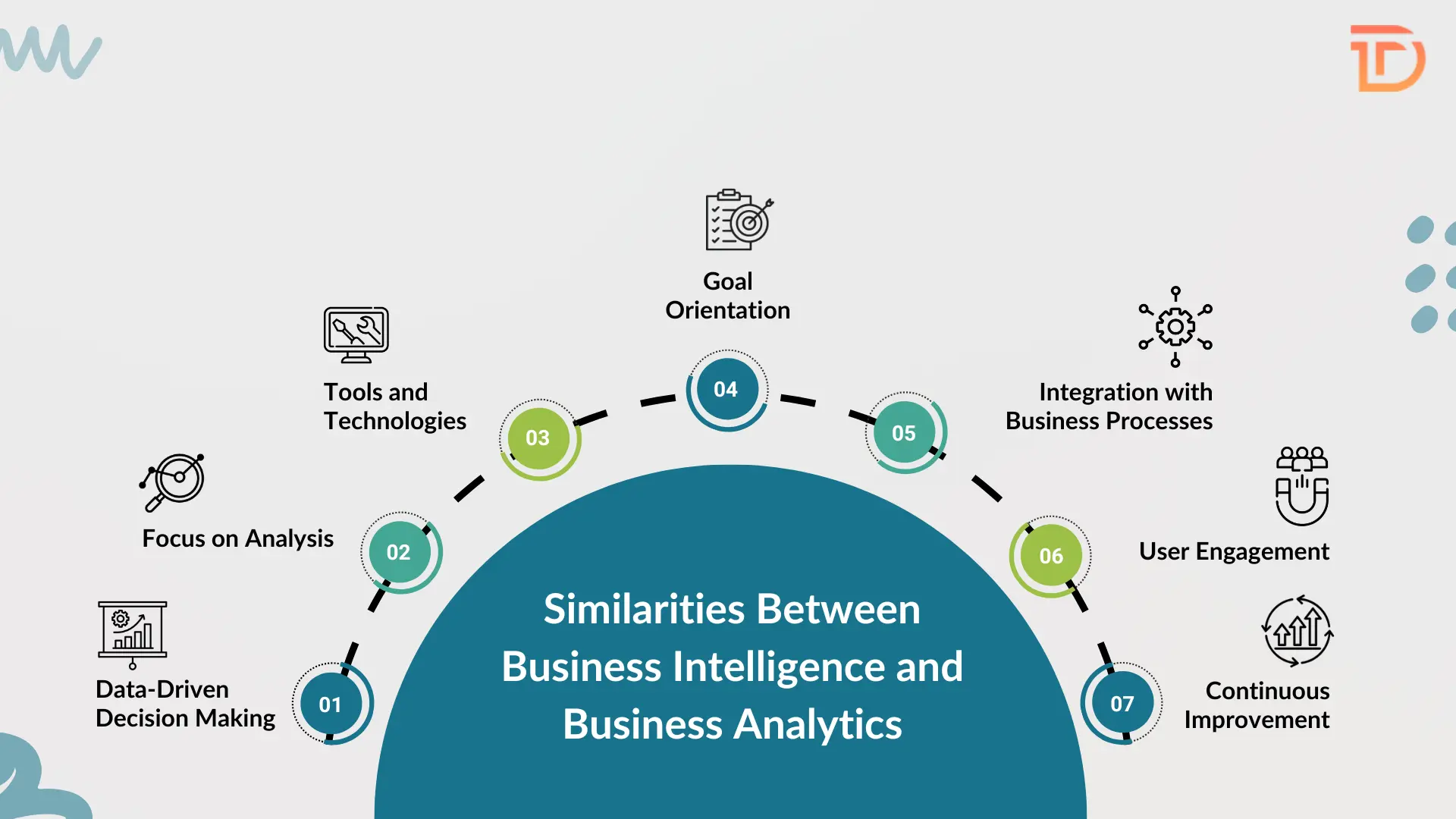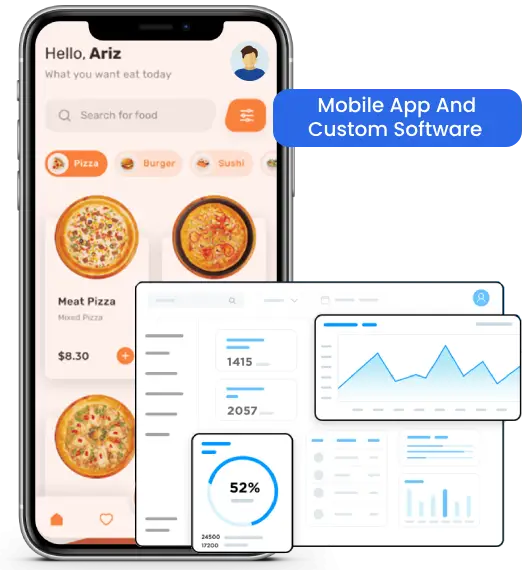In today’s data-driven world, businesses are packed with vast amounts of information. To harness this data effectively, two terms often come up: business analytics and business intelligence. While they may seem interchangeable, they serve different purposes and have unique methodologies. Let’s delve into these differences and explore how they can benefit your organization. Stride along to know the deep insights on BI and BA for businesses.
What is Business Intelligence?
Business intelligence (BI) refers to the processes and technologies that convert raw data into meaningful insights. BI focuses on descriptive analytics, enabling organizations to understand past performance and current conditions through data visualization and reporting. Common BI tools include dashboards, reports, and data mining applications.
Advantages of Business Intelligence
- Informed Decision-Making:
- Provides actionable insights through data visualization and reporting.
- Enhances strategic planning with data-driven evidence.
- Improved Operational Efficiency:
- Identifies process bottlenecks and inefficiencies.
- Streamlines operations by optimizing resource allocation.
- Enhanced Customer Insights:
- Analyzes customer behavior and preferences.
- Improves customer segmentation and targeted marketing efforts.
- Competitive Advantage:
- Helps organizations stay ahead of market trends.
- Facilitates quick responses to competitive threats.
- Cost Reduction:
- Identifies areas for cost savings through better resource management.
- Minimizes waste and redundancies in processes.
Disadvantages of Business Intelligence
- High Implementation Costs:
- Initial setup and integration can be expensive.
- Ongoing maintenance and updates may incur additional costs.
- Complexity of Tools:
- Requires specialized skills and training to operate effectively.
- Users may struggle with complex interfaces and functionalities.
- Data Quality Issues:
- Inaccurate or incomplete data can lead to flawed insights.
- Dependence on data sources may introduce inconsistencies.
- Resistance to Change:
- Employees may resist adopting new BI tools and processes.
- Cultural barriers can hinder effective implementation.
- Over-Reliance on Data:
- Organizations may focus too much on data, neglecting qualitative factors.
- Can lead to decision paralysis when data is inconclusive.
What is Business Analytics?
On the other hand, business analytics takes a more forward-looking approach. It focuses on predictive and prescriptive analytics, utilizing statistical models and algorithms to forecast future trends and outcomes. This enables organizations to make proactive decisions based on data insights.
Advantages of Business Analytics
- Predictive Insights:
- Utilizes statistical models and algorithms to forecast future trends.
- Helps in proactive decision-making by anticipating market changes.
- Data-Driven Strategies:
- Supports the development of strategies based on quantitative analysis.
- Encourages experimentation and optimization of business processes.
- Enhanced Performance Measurement:
- Tracks performance metrics in real-time, allowing for quick adjustments.
- Facilitates goal setting and monitoring through data analysis.
- Risk Management:
- Identifies potential risks through data analysis and predictive modeling.
- Enables organizations to implement mitigation strategies early.
- Innovation Promotion:
- Encourages a data-driven culture that fosters innovation.
- Supports experimentation and testing of new ideas.
Disadvantages of Business Analytics
- Skill Gap:
- Requires skilled analysts who can interpret complex data.
- A shortage of qualified professionals can hinder effective implementation.
- Data Privacy Concerns:
- Increased reliance on customer data raises privacy and compliance issues.
- The risk of data breaches can damage reputation and trust.
- Complexity of Data Interpretation:
- Misinterpretation of data can lead to incorrect conclusions.
- Requires a deep understanding of statistical methods and tools.
- Time-Consuming:
- Analyzing large datasets can be time intensive.
- Delays in obtaining insights may slow down decision-making.
- Dependence on Technology:
- Organizations may become overly reliant on analytical tools.
- Technology failures can disrupt business operations and analytics processes.
Key Differences Between Business Analytics and Business Intelligence
| Category | Business Intelligence | Business Analytics |
|---|---|---|
| Focus and Purpose | Analyzes historical data to inform business decisions | Predicts future trends and provides recommendations for strategic planning |
| Methods and Tools | Uses dashboards, reporting tools, and data warehousing (e.g., Power BI) | Uses advanced statistical techniques, machine learning, and algorithms |
| Outcomes | Provides insights into what has happened and why it happened | Offers insights into what could happen in the future and how to respond |
Similarities Between Business Intelligence and Business Analytics

- Data-Driven Decision Making: Both BI and BA rely on data to inform decisions.
- Focus on Analysis: Both fields involve analyzing data to extract insights.
- Tools and Technologies: They often use similar software like dashboards and data warehouses.
- Goal Orientation: Both aim to improve performance and efficiency.
- Integration with Business Processes: Both support decision-making across various processes.
- User Engagement: Insights from BI and BA are designed to be actionable for stakeholders.
- Continuous Improvement: Both encourage a data-driven culture of ongoing enhancement.
What Does Your Business Need: Business Intelligence or Business Analytics
When to Choose Business Intelligence (BI)
- Focus on Reporting and Dashboards: If your primary need is to create reports and dashboards for tracking key performance indicators (KPIs) and operational metrics, BI tools are ideal.
- Historical Data Analysis: If you need to analyze historical data to identify trends and patterns, BI can provide the insights necessary for performance evaluation.
- Data Visualization Needs: If your organization requires visually appealing data representations to communicate findings to stakeholders effectively, BI tools excel in this area.
- Operational Efficiency: If improving operational efficiency and identifying process bottlenecks are your main goals, BI can help streamline operations through data-driven insights.
- Centralized Data Management: If you’re looking to consolidate data from various sources for a unified view, BI solutions can centralize and standardize data management.
When to Choose Business Analytics (BA)
- Predictive and Prescriptive Insights: If your organization seeks to forecast future trends or optimize decision-making processes based on data, BA is the right choice with its predictive and prescriptive capabilities.
- Complex Data Analysis: If you need to conduct advanced statistical analyses or utilize machine learning models to derive insights, BA tools provide the necessary functionalities.
- Experimentation and Testing: If your business culture encourages experimentation and you want to test hypotheses using data, BA tools can facilitate this iterative process.
- Customer Personalization: If personalizing customer experiences and targeting specific segments based on data-driven insights is a priority, BA can help analyze behavior patterns effectively.
- Risk Management: If identifying potential risks and developing strategies to mitigate them are crucial for your business, BA provides tools for in-depth risk analysis.
When to Choose a Combination of Both
- Integrated Approach: Many organizations benefit from both BI and BA. A solid BI foundation can provide historical insights that inform predictive analytics, allowing businesses to make informed, strategic decisions based on both past performance and future projections.
Summing Up Everything
Understanding the differences between business analytics and business intelligence is vital for any organization aiming to leverage data effectively. By utilizing the right tools, the expertise of a skilled data visualization consultant, and effective development strategies, businesses can turn data into a powerful asset. Whether you opt for business intelligence application development or invest in analytics, the key is to align your data strategy with your overall business goals.
By leveraging data-driven insights, you can know the true potential of the business and push the same towards exponential growth. Take the first step and collaborate with Dreamer Technoland – a leading custom software development company in Noida, offering business intelligence and business analytics services to take your business to the next level. Embrace the data revolution and watch your business thrive!







